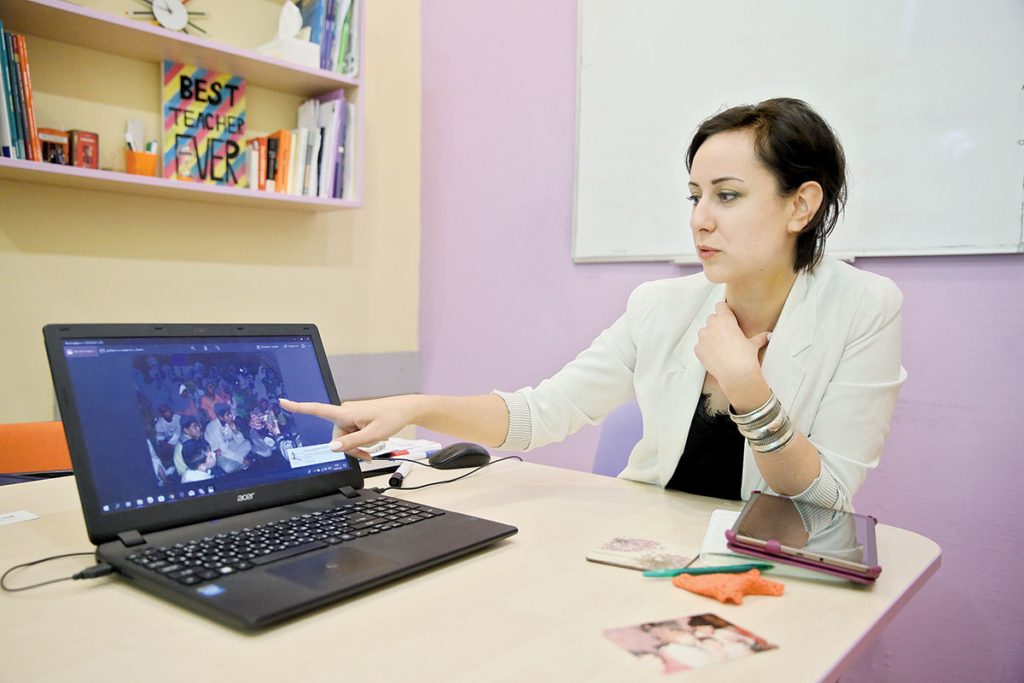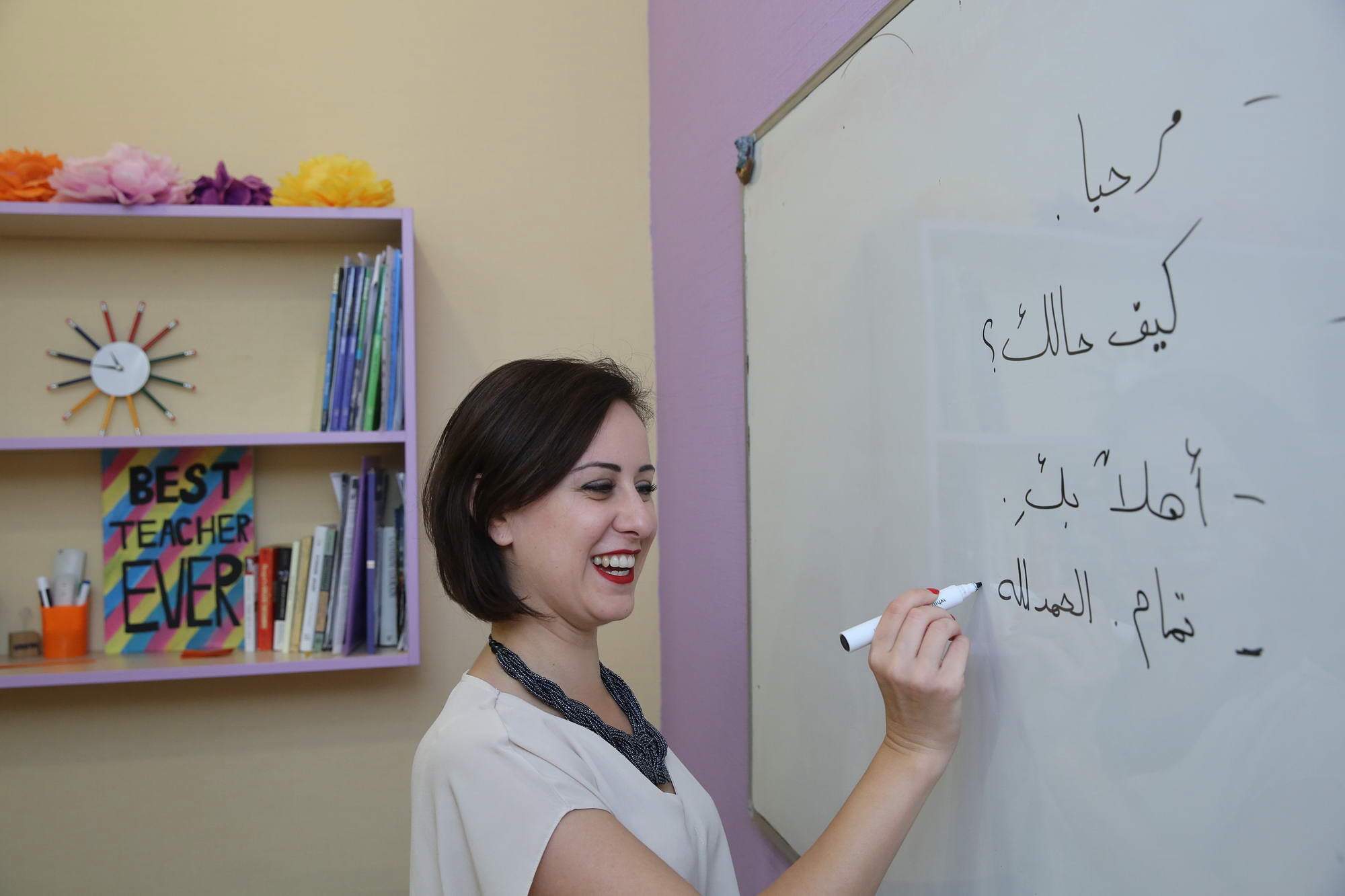Jad Alsibai is only nine. But he has already twice experienced living in a war zone and twice became a refugee.
His family had to leave Damascus, Syria, in spring 2013, when he was just 4, packing, as his father says, “all their previous life in a small suitcase” and starting all over in Donetsk.
His father, Shaker Alsibai, chose Donetsk because he studied computer programming in this city, knew Russian and had a university friend there who helped him to find a job as a freelance programmer.
In summer 2014, Jad’s family had to flee from Donetsk to Kyiv, escaping this time from Russian’s war against Ukraine.
At his first New Year’s Eve in Kyiv, Jad was afraid of fireworks, which triggered memories of bombing. But smiling and talkative, he soon found many new friends, learned both Russian and Ukrainian languages and now teaches his father how to write in Ukrainian.
Jad’s father and mother are not as adaptable.
They had thought that the war in Syria would be over in several months, but it has continued now for more than seven years. When they headed to Kyiv, traveling by one of the last trains to depart from Donetsk, they didn’t even take any warm clothes, expecting the war in Donetsk would be over soon. But it has now raged into its fifth year.
“Being a refugee is hard but it’s anyway better than living at war,” said Shaker Alsibai, 38, speaking at the flat that the family is renting in Kyiv, and hugging his kids.
Special status
As of January, there were 452 Syrian refugees living in Ukraine and about 600 Syrians were seeking asylum in the country, according to data from the United Nations Refugee Agency.
In most cases, the Ukrainian government granted Syrians, including the Alsibai family, a “complementary protection” status instead of refugee status, which allows them to live in Ukraine until the war in their country is over.
Shaker Alsibai said his family meets sometimes with other members of the Syrian community at a mosque. But he doesn’t have many contacts with fellow Syrians because many of them are young and single university students.
But one family friend from Syria is Ilyana Almasoud, who also has a remarkable story to tell of her escape from two wars.
Growing up in Syria
Almasoud, 31, has a Syrian father who studied aircraft engineering in Kyiv, and a Ukrainian mother.
Ukraine has been a popular destination for Syrian students since the times of the Soviet Union, for which Syria was one of the main allies in the Middle East.

Ilyana Almasoud shows pictures on June 5 of pre-war life in Syria. After fleeing the seven-year civil war in Syria and then fleeing Russia’s war in the Donbas, Almasoud relocated to Kyiv, where she has started Fusion Language Group, a school teaching English and Arabic. (Oleg Petrasiuk)
Almasoud was born in Makiyivka, a now Russian-controlled city of 350,000 residents nearly 800 kilometers southeast of Kyiv. It is her mother’s home city. She moved to Syria with her parents when she was three.
She said it was not easy. She found children in Syria, where families are usually bigger than in Ukraine, more independent and aggressive. They often walk barefoot and may throw stones at strangers.
“I was a cute girl with curly hair in short dresses. When I was four I understood: don’t wear short dresses even when you are a child,” she said.
Eventually, she found good friends at school, where she was studying in Arabic and learning the Koran. She was the only Christian at her school, but she studied Islam along with other kids. Her classmates were worried she might go to hell because she was Christian.
Her father was forced to resign from military service because he married a foreigner. He then worked in a company that assisted in the visa process with the Ukrainian Embassy.
In the 1990s, Syria became a popular destination for Ukrainian merchants, who would travel there to buy goods to resell in Odesa, Kharkiv and other big Ukrainian cities.
Initially, the family lived in Homs, but then they moved to Aleppo and after that to Damascus, where Almasoud studied English language and literature and later worked at the prestigious Higher Language Institute.
Seeing war in Donetsk
But that life ended in July 2012. Almasoud and her younger brother went for two weeks to visit their mother who had earlier returned to Ukraine.
The situation in Damascus was relatively quiet, but she noticed her father was crying at the airport. In the following week, the airport in Damascus was bombed, so they couldn’t return from Ukraine and decided to stay for some time longer with their mother.
Almasoud found a job at an English language school in Donetsk and got married the next year. But in July 2014, the school’s owners closed the business because of the war, and moved to Kyiv.
Almasoud said that by that time she had to cross the checkpoints every day on her way from Makiyivka, where she lived, to Donetsk, where she worked.
“It was a flashback to what I witnessed in Syria. Though in Syria it was uglier,” she said.
Obliterated heritage
Almasoud moved to Kyiv along with the other teachers of the language school. In January 2015, she opened her own language school, Fusion Language Group, where she teaches English and Arabic. Her brother went to study in Kharkiv.
Almasoud said she was trying to “bottle up her feelings” when she was getting news from TV that the cities she lived in Syria were being bombed into rubble. But she couldn’t hold back tears when the Islamic State forces destroyed the ancient city of Palmyra, one of the gems of cultural heritage in Syria.
“It was like part of my soul was obliterated and wiped out,” she said.
She also cried from helplessness when visiting in 2017 her relatives in Makiyivka, now controlled by the Russian-led troops. It looked like she was in another country, with people in Russian military uniforms walking around and Russian rubles being used as currency instead of hryvnias.
“It’s like someone comes to your house and says — you don’t live here anymore, you are nobody now, you are a stranger,” she said.
She also misses her life in pre-war Damascus, where she was often partying with young and well-educated people, most of whom had to later seek refuge in Europe.

Ilyana Almasoud writes in Arabic on a board in her language school Fusion Language Group in Kyiv, where she teaches Arabic and English. (Volodymyr Petrov)
Vicious circle
Being half-Syrian and half-Ukrainian, Almasoud said she’s feeling a bit groundless, but at the same time open to new adventures. She, nevertheless, enjoys all benefits of Ukrainian citizenship.
For the Alsibai family, it’s much harder. Jad’s sister Julia, who is now three, was born in Kyiv and has Ukrainian citizenship. Her family members are entitled to get a residence permit by law. But to do that they have to travel to Syria or to Lebanon and apply to a local Ukrainian embassy for a visa.
But apart from the fact that it’s a long and expensive trip, there’s no guarantee that they will be allowed into Lebanon, which often restricts Syrian refugees from coming there, or that Ukraine’s government would give them visas.
So the Alsibai’s will more likely renew those complementary protection statuses, under which they risk to be expelled from the country at any moment.
The state migration service is very selective in giving this status to Syrians. Some of them have to live for years without being able to work or study legally in Ukraine, said Anna Khitsevych, a lawyer from the Right to Protection, a Ukrainian non-governmental organization that supports the refugees. So many well-educated Syrians have nowhere to go for work, apart from selling goods at the market.
“It’s like a vicious circle,” Alsibai said.
